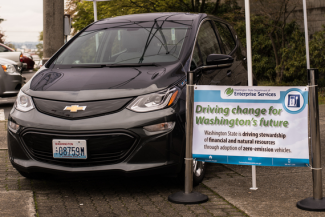Earth Day 2017: Washington State doubles down on electric vehicles, encourages others to do the same
Photos
Download photos from the Electric Vehicles (EV) and Electric Vehicle Supply Equipment Open House on April 20, hosted by the Washington State Department of Enterprise Services:
State and local government employees take a look at the 2017 Chevrolet Bolt EV LT, the Nissan Leaf, a GreenPower Bus, and a ZERO motorcycle.

Longer-range electric vehicles can go more than 200 miles on a single charge.
Olympia - On the eve of Earth Day 2017, Washington State is doubling its electric vehicle (EV) fleet by adding long range, zero-emission vehicles, and encouraging other organizations in the state to follow suit. Adding electric vehicles with a 200-plus mile range will help the state improve air quality and save taxpayer dollars.
"We must defeat climate change by using all the tools available, including what we buy in the marketplace for daily use. All institutions need to focus their procurement policies and practices on low-carbon options, as these investments will save money, protect public health, and secure our long-term future," said Gov. Jay Inslee, noting that increasing EV use in state government is one important step Washington can take to reduce carbon pollution.
"It's exciting that these long-range electric vehicles are now an option for all state agencies," said Washington State Department of Ecology Director Maia Bellon. "At Ecology, we're working on making the switch to electric vehicles because we want to reduce our carbon footprint and lead by example. We're looking forward to adding our first long-range EV to our fleet."
Government vehicle fleets typically have a large carbon footprint – and gas automobiles are the largest overall source of carbon emissions for the state. The EVs will improve Washington's air quality by each emitting 2.3 to 3.3 fewer metric tons of carbon emissions annually over hybrid options. State law requires passenger vehicles used by state agencies to be low or zero emission options to the extent feasible.
Local governments, many of which still use gas powered cars, also can purchase electric and hybrid vehicles from state contracts. Replacing a gas car with an electric vehicle saves 4.7 metric tons of carbon emissions annually.
Gov. Inslee is committed to reducing carbon pollution from the transportation sector. During the Paris Climate Conference in Dec. 2015, Inslee announced his Washington State Electric Fleets Initiative to accelerate adoption of electric vehicles in public and private fleets. This initiative will ensure that, beginning this year, at least 20 percent of all new annual state passenger vehicle purchases are EVs.
Inslee took this action to help fleets scale up their use of EVs, and to "double-down" on the 10 percent EV fleet target established by the Pacific Coast Collaborative, in 2013.
Last fall, the state took action by ordering more than 130 long-range EVs. The first deliveries arrived this week. Prior to the order, the state had about 120 EVs in its fleet.
The EV purchases were made within the first three days that a long-range EV option became available on Washington state's vehicle contract. Long-range EVs can go more than 200 miles on a single charge.
There are now seven EV passenger vehicle options on the state contract as well as other types of vehicles including forklifts, trucks and buses. The Department of Enterprise Services, which oversees the statewide vehicle contract, is constantly working to add more zero-emission options.
State agencies have been analyzing their vehicle fleets to determine which vehicles can be replaced with EVs. As part of fleet management best practices, vehicles are replaced as they come to the end of their useful life. Proper vehicle replacement minimizes costs and assures safety.
Enterprise Services Director Chris Liu said replacing other types of vehicles with EVs makes good business sense, and that the state's central service agency is committed to securing new zero-emission options on contracts that can be used by both state agencies and local governments as they become available.
"They cost less to own and operate than gas cars," he said, "because they are less expensive to fuel and maintain."
About Enterprise Services
The Department of Enterprise Services oversees statewide master contracts for goods and services, including vehicles.
###